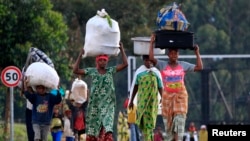KAMPALA —
Life in a refugee camp is hard, but seeking justice as a refugee can be even harder. Foreign legal systems can be confusing to refugees, and the camps are often located far from the nearest courthouse.
That is why the U.N. refugee agency has decided to bring the courts to a Ugandan refugee camp.
“We set up these mobile courts as a result of refugees and some of the local Ugandans having to wait very long times before they had access to justice, or having to travel very long distances to reach the government courts," said UNHCR’s Lucy Beck, referring to a new traveling judiciary that recently held two sessions in the Nakivale refugee settlement.
Similar to courts in Kenyan and Zambian camps, lawyers at Nakivale are provided pro bono by the Ugandan government. Since being established in May, the court has processed cases addressing fairly minor crimes, though UNHCR is planning to bring in a high court judge soon to hear 50 serious cases, the majority of which, says Beck, are rape cases.
Three-quarters of the refugees in southwestern Uganda come from the neighboring Democratic Republic of Congo, where rape is often used as a weapon of war. Because of this, DRC is considered one of the most dangerous places in the world to be a woman, and the pattern of violence, says Beck, tends to carry over into refugee populations.
“One of the main reasons for this court is to try and encourage people to report more, so that we can find out all of the cases within the community," she said. “The reality is that ... probably a lot of the cases aren’t being reported or coming to our attention.”
UNHCR has found that poverty and high unemployment rates among refugees make women more vulnerable to rape. But the American Refugee Committee’s Philbert Murungi, who works with rape victims, says even a woman’s daily chores can put her at risk.
“Some of them are attacked on their way towards the water point, some of them are attacked on their way towards collecting firewood for fuel and domestic use," he said.
But the stigma of being assaulted can be crushing, and Murungi says victims often find themselves rejected by family and isolated from their community.
There are also safe houses available for these women, he said, explaining that creating safe locations and providing mobile courts will help women avoid rape and make it easier to report.
“But if they are unwilling to do so, there is only so much any court can do," he says. “She would fear the community itself. She might fear saying it out to her parents. They do not report, they fear. In defilement and rape cases, evidence is so crucial. If these people can come up, then it would be better.”
But the court can only offer so much. With more than 70 percent of rapes among Congolese refugees perpetrated in the DRC, Beck says many of them are nearly impossible to prosecute in Uganda, which means justice may always remain out of reach for some women.
That is why the U.N. refugee agency has decided to bring the courts to a Ugandan refugee camp.
“We set up these mobile courts as a result of refugees and some of the local Ugandans having to wait very long times before they had access to justice, or having to travel very long distances to reach the government courts," said UNHCR’s Lucy Beck, referring to a new traveling judiciary that recently held two sessions in the Nakivale refugee settlement.
Similar to courts in Kenyan and Zambian camps, lawyers at Nakivale are provided pro bono by the Ugandan government. Since being established in May, the court has processed cases addressing fairly minor crimes, though UNHCR is planning to bring in a high court judge soon to hear 50 serious cases, the majority of which, says Beck, are rape cases.
Three-quarters of the refugees in southwestern Uganda come from the neighboring Democratic Republic of Congo, where rape is often used as a weapon of war. Because of this, DRC is considered one of the most dangerous places in the world to be a woman, and the pattern of violence, says Beck, tends to carry over into refugee populations.
“One of the main reasons for this court is to try and encourage people to report more, so that we can find out all of the cases within the community," she said. “The reality is that ... probably a lot of the cases aren’t being reported or coming to our attention.”
UNHCR has found that poverty and high unemployment rates among refugees make women more vulnerable to rape. But the American Refugee Committee’s Philbert Murungi, who works with rape victims, says even a woman’s daily chores can put her at risk.
“Some of them are attacked on their way towards the water point, some of them are attacked on their way towards collecting firewood for fuel and domestic use," he said.
But the stigma of being assaulted can be crushing, and Murungi says victims often find themselves rejected by family and isolated from their community.
There are also safe houses available for these women, he said, explaining that creating safe locations and providing mobile courts will help women avoid rape and make it easier to report.
“But if they are unwilling to do so, there is only so much any court can do," he says. “She would fear the community itself. She might fear saying it out to her parents. They do not report, they fear. In defilement and rape cases, evidence is so crucial. If these people can come up, then it would be better.”
But the court can only offer so much. With more than 70 percent of rapes among Congolese refugees perpetrated in the DRC, Beck says many of them are nearly impossible to prosecute in Uganda, which means justice may always remain out of reach for some women.




